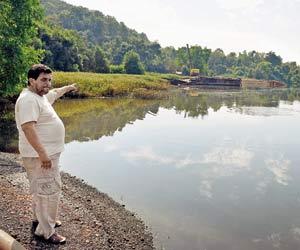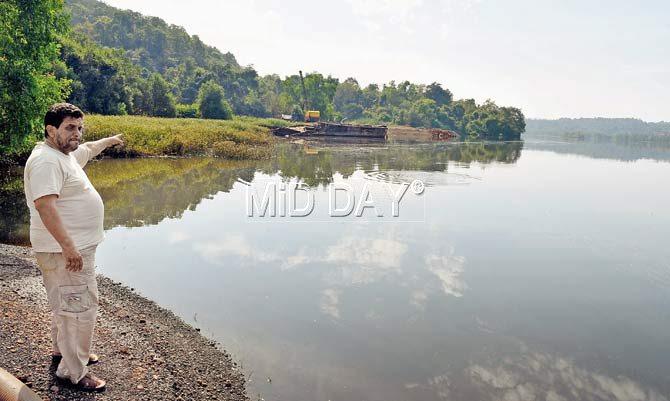Once blessed with fertile land and lush rivers, Mahad is now afflicted with cancer, asthma, paralysis and skin infections, thanks to toxic effluents that drip from a leaky 17-km pipeline passing through 28 villages

For the villagers, this place was once heaven on Earth - blessed with fertile, green land and plenty of fish and water from the Savitri and Gandhari rivers, the locals did not want for anything. Things could not be more different now. Thanks to rampant chemical pollution, living in Mahad is nothing short of a death sentence for the locals, who cannot farm, fish or drink the water without the fear of being poisoned.
ADVERTISEMENT

The water in rivers and wellsâu00c2u0080u00c2u0088has turned black, with rising toxic fumes. Pics/Shadab Khan
Last week, mid-day visited Tudil village, named after the tur daal crops that once used to stretch on for acres and acres, as far as the eye could see. But when this reporter arrived there, the farms were barren, the mood was grim, and the air reeked of poisonous chemicals.

Villagers protesting after another leak on Wednesday
Nearly 100 villagers - from Tudil and neighbouring hamlets - sat on the road, blocking all traffic to protest a major leakage from the chemical pipeline running through the village. They knew what was going to happen next; it had already happened so many times before. The toxic water - effluents from the nearby chemical plants - would overflow into their farms and water sources, kill all their crops and fish, and eventually leave them with diseases like cancer, asthma, paralysis and skin infections.

Locals said there are at least two leaks in the pipeline every day
The protest was headed by Faisal Chandale, a local running a sand mining business. "The chemical pipeline carries chemical waste from Mahad MIDC, which is 17 km away. The pipeline passes through 28 villages, and has leaked time and again in many of these places. The pipeline was built in 1980, when there were no more than 50 factories here. But now, this number has risen to 200, and the pipe can't handle the load," he said.

The locals staged a 6-hour rasta roko to demand justice for the rampant pollution in their villages
Daily leaks and negligence
The irate villagers blocked the road for over six hours, demanding that the authorities register a case against those responsible for such devastating pollution. During the rasta roko, the villagers also stopped the vehicle of Subash Angre, an MIDC employee, who mentioned that such leaks occurred every day.

Rafiq Pore and Rafiq's wife, Dilshad, died of lung cancer
"There are 22 air valves in the pipe, and these break down when too much gas is trapped inside. We have been specially appointed to maintain the pipeline and repair such leaks. We have to repair at least two leaks on a daily basis," said Angre. The key to the problem is the gas trapped inside the pipe, which points to negligence by the MIDC authorities, alleged the villagers.
"After continuous protests, the authorities established a CETP (Common Effluent Treatment Plant) a few years ago. The CETP is supposed to clean and filter the chemical waste before discharging it in the sea. But the system has many errors. The CETP doesn't bother to clean the waste and simply releases it. This leads to a build-up of gas in the pipeline, causing further leaks," alleged Nizamuddin Jalal, 55, who has been fighting the pollution for 15 years, and has also filed a PIL in the high court.
Jalal claimed that a few years ago, he used to grow up to four lakh watermelons a year on his farm, but the toxic waste had completely destroyed his farm and business. "Even when a leakage is reported, the MIDC employees merely plug the leak with a wooden stick. How long can a wooden stick hold up?" he added.
Jalal alleged that the Maharashtra Pollution Control Board (MPCB) had ignored their complaints. "Every time the MPCB collects the chemical waste, they tamper with the sample and claim that it is clean. FIRs should be filed for every leak, but in the last decade, not a single FIR has been lodged," he claimed.
Cancer for the village
The very air in the villages reek of death and danger, and even the children know how risky it is to drink from the local wells. But what do you pick when the choice is between dying of thirst or risking cancer? Local farmer Sandeep Umasare, 30, gave in to his thirst and drank from a well, only to develop throat cancer. His father became paralysed and his neighbours suffer from various stages of paralysis and convulsions.
Parsuram Tambe, 39, who hails from Lower Tudil, lost everything to the chemical waste. "After the toxic water entered our farm, I became paralysed and my parents died of cancer last year. Our farm cannot be cultivated anymore either," he said, adding, "Out of the 20 families in our village, at least five people have been diagnosed with cancer. Fevers and body aches are very common too."
Manik Jagtap, former Shiv Sena MLA, also joined the protest in the evening. "Earlier, I was aware about the health hazard, but now two of my family members have cancer. I am continuously following up and fighting with the government bodies to stop the factories," he said.
Shabbir Ali Duste, 60, who resides barely 5 meters distance from the leaking air valve, said, "Since the last five years, the water stinks so bad that we can't even cook food. Children can't even sleep due to suffocation. When we protest, the authorities just threaten to register a case against us," he alleged.
Advocate Arif Deskmukh, an activist against chemical pollution, said that the toxins had resulted in an alarming rise in cancer and premature delivery of babies. "These days, on average, just one among 100 pregnant women have normal deliveries. More than 100 people have been detected with cancer in these villages, including three of my family members. Scientists from the US visited a year ago and found that every third person will suffer from cancer in the coming years," he said.
Crops dying too
Prakash Chivilkar, 48, a farmer from Tudil, said, "In August, the chemical waste entered our farm and destroyed the land. When we went there to check on the crops, our hands and legs developed skin infections due to the contaminated water. The rice crops were ruined too. Even if we tried to salvage the rice, we wouldn't be able to eat it because of the stench. This year, we will have to buy our food from the market."
Baban Sambhaji Rasal, 67, added, "We used to grow more than 1,000 kg of rice on our land, but this year, we hardly got 100 kg. Eating these crops results in diseases too." Among the villages affected by the chemical sludge are Juhi, Tudil, Lower Tudil, Kumbale, Kosbi, Sauv, Kol and Ghote. Sunil Jadhav, former sarpanch of Ghote village, recalled, "More than 150 farmers and 50 acres of farm land were affected this year,but the authorities are least bothered. In 2008 and 2009 too, chemical waste had destroyed farmland, but MIDC gave the compensation only this year - 10 years after the damage."
Sufiyan Samnake, 27, from Chimbave village, said, "In 2009, the toxic waste destroyed our land and made my father very ill. But we only got compensation this January, a month after my father succumbed to his illness. What is the use of this money when I can't use it to save my father? The officials are just playing with our emotions."
Official speak
Datta Nalawade, Mahad DYSP, who wrote to the concerned departments to demand action, said, "It's not a problem that can be solved in a day. We have asked the MIDC and MPCB officials to meet the villagers and warned them not to play with our emotions, as the issue is clearly resulting in health problems."
Pramod Mane, sub-regional official, Mahad MPCB, said, "Chemical leaks from the MIDC pipelines has been going on for more than three months. We have informed the MIDC, but they only do small repair work. We can't claimed that the water is completely clean, but if it enters farms, it can result in pollution and losses."
Ajit Dhabekar, Talati from the Revenue Department, also arrived on the scene and is preparing a report on the matter. He said, "We have done panchnama at the affected farms and have sent the details to the tehsildar's office."
Dumped by wife
"The stench in our village was so bad that my brother Papu's wife left him and fled. She used to find the smell unbearable," said Mahir Duste, 30. But that's not the only trauma the family has suffered; one of the children, three-year-old Sidra was diagnosed with asthma. "We've lost our livelihoods too. Our ancestors were fishermen, but we don't dare to fish anymore. We used to have 40 goats, only one of them is left now," Mahir added.
Hungry crocs prowling
The villagers are not the only ones running out of food - thanks to the chemicals, even crocodiles (in pic) are unable to find any fish in the rivers. "The crocodiles have now started coming near our villages, putting our children at risk," said Faisal Chandale.
Awards for polluting?
Activist Nizamuddin Jalal pointed out that despite the alleged negligence, Mahad MIDC and the CETP plant won two awards for cleanliness. "Whoever is giving these awards should do some research to see what the ground reality is. Bad smell and dirty water is very common. People usually vomit while eating due to the stench," he said.
'We'll make them drink it'
The protestors made MPCB officials collect samples of the chemical waste for testing. "We also met officials on Thursday and said that if the officials insist that the water is clean, we will force them to drink it, or at least wash their faces with it, to prove how safe it is," said a local. The villagers have now demanded that the Union Health Ministry and the World Health Organisation (WHO) conduct a survey in Mahad to establish just how harmful the toxic effluents are for the locals.
Lost his wife to toxic well
Rafiq Pore, 48, a farmer from Lower Tudil, remembers how it began. "My wife, Dilshad, complained of cough and shortness of breath. We consulted a doctor in Mumbai, who said she was in the last stage of lung cancer. She died 22 days later, on April 6, 2014, leaving me and our three kids behind," he recalled. "There was an air valve right in front of our house, and the fumes and water would constantly enter our house. The well adjoining our house was also polluted. After my wife died, the villagers stopped using the well. the government should take action," said Rafiq.
37
Age of pipeline
180 km
Distance between Mumbai and Mahad
6
Number of hours the raasta roko protest lasted
99%
Average number of women who have premature deliveries
Download the new mid-day Android and iOS apps to get updates on all the latest and trending stories on the go
 Subscribe today by clicking the link and stay updated with the latest news!" Click here!
Subscribe today by clicking the link and stay updated with the latest news!" Click here!






